Barker v. Conroy
The head of the organization “Freedom From Religion” claimed that it was unconstitutional for Congress to open the day with a prayer and not to allow secular invocations as well.
The district court rejected this argument and ruled for the defendant. This case is controlled by two Supreme Court decisions that upheld legislative prayer as constitutional.
We believe that the district court was right. As long as legislative prayer is not coercive or offered in an attempt to proselytize, it is allowed by the First Amendment. Congress is permitted to prefer prayer to secular invocations because prayer offers unique benefits. JCRL submitted an amicus brief highlighting two of those unique benefits.
First, legislative prayer is good for Jews (and other minority religions) because it promotes religious harmony and pluralism. The House of Representatives allows religious leaders from all faiths to give the opening prayer. Jews, Muslims, Pagans, and members of many other faiths have given the opening prayer. It is a testament to the fact that, despite our difference, we can all coexist and respect one another. We are all united by our fundamental belief in something separate from ourselves. The plaintiff did not wish to expand this tent.
He did not want to offer a prayer, but to kick down the tent and destroy this unifying force.
Second, legislative prayer is a symbol of the role that religion played and continues to play in public life. Jews have many public rituals, some of which require government aid or permission. Our legislators and fellow citizens are more likely to view our requests favorably if they are reminded of the important role that religion plays in American life. Hearing a rabbi offer an opening prayer in Congress (or a local legislature) is a positive experience that can help shape people’s views of Judaism. It is the type of unifying experience that will hopefully predispose people to view Judaism in a favorable light.
Banning legislative prayer would send a dangerous message that religion is somehow toxic and unfit for the public square. That is a dangerous message to send, especially for members of minority faiths.
The full text of our brief can be found here.
